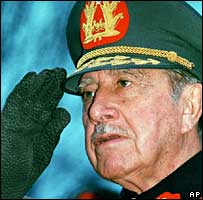
Chileans are divided over Gen Pinochet's legacy
|
Over the past six years, the Chilean justice system at various times stripped the country's former military ruler, Augusto Pinochet, of his immunity from prosecution as a former head of state and placed him under house arrest.
But despite many legal developments, he was never brought to trial.
The BBC News website looks at the charges against him and the issues surrounding Gen Pinochet's court cases.
What charges did Gen Pinochet face?
These broadly fall into two kinds - related to human rights abuses and related to tax evasion.
In November 2006, a judge ordered Gen Pinochet to be placed under house arrest over the abduction in 1973 of two bodyguards of former President Salvador Allende, who was overthrown by the military.
The charges relate to the Caravan of Death - an operation to remove opponents to military rule.
Gen Pinochet was also placed under house arrest in October over allegations of kidnap and torture of political prisoners at the infamous Villa Grimaldi detention centre, but he was subsequently freed on bail.
Other human rights cases include the disappearance of dissidents in 1975 in what was known as Operation Colombo. Gen Pinochet was charged in connection with the kidnapping of at least three dissidents by the security services.
The charge was of "permanent kidnappings", meaning that the bodies of the victims, who are presumed dead, have never been found.
At least 119 people are alleged to have been abducted by state forces and later killed in the 1975 secret operation.
What about the financial cases?
Gen Pinochet was charged over tax evasion and falsifying passports, although two charges relating to secret offshore bank accounts were dropped in April.
The charges related to $27m (£15.6m) stashed in bank accounts outside Chile, which came to light in 2004 during a US Senate investigation.
Gen Pinochet's lawyers said the money came from donations, savings and interest on investments.
Wasn't he declared too ill to face charges?
Yes. Some human rights cases against Gen Pinochet collapsed because the Chilean courts ruled he was too ill to stand trial. And, in 2000 the then UK Home Secretary, Jack Straw, released Gen Pinochet from house arrest in Britain after he was declared unfit to stand extradition proceedings.
Prosecutors argued that the former ruler had "simulated" his mental health problems and at times they managed to persuade judges that he was fit to go to trial, although no actual proceedings ever began.
Why did this all take so long?
In Chile, immunity can be lifted only on a case-by-case basis. Each time a case was brought against Gen Pinochet it went through several appeals until it reached the Supreme Court.
In the Operation Colombo case, for example, the Supreme Court backed an Appeal Court ruling stripping the former ruler of his immunity. However, at the same time it ordered that he undergo new medical tests, a process that took two months.
Did Chileans believe he would ever face trial?
No. His worsening health all but ruled that out. Sixteen years after he left office, no prosecution had managed to make it to court, despite repeated lifting of his immunity.
Interestingly, to mark his 91st birthday in November, Gen Pinochet issued a statement saying he took political responsibility for everything that happened during his time in power. He had acted, he said, in Chile's best interests.
At the same time he condemned the ongoing trials of military officers, including himself, for abuses committed under his rule.
How popular was he in Chile?
Chilean society tends to be very divided on Gen Pinochet and the legacy of his 17-year rule, and the reluctance to actually try him may have been a reflection of that.
While many consider him a murderous and repressive dictator, others view him as the man who saved Chile from communism and turned the country into an economic success story.
But observers say the investigation into Gen Pinochet's finances did seriously damage his standing among his supporters, who used to praise his honesty.


~RS~q~RS~~RS~z~RS~20~RS~)